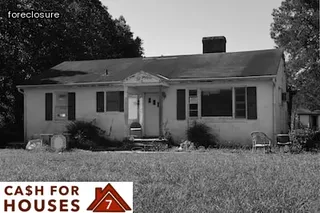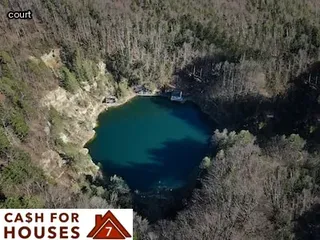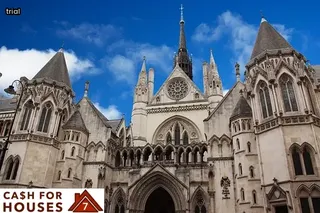When a court orders the sale of property, it is often a complicated process that requires knowledge of the legal system. In North Carolina, there are several steps in the process involved with selling real estate under court order.
To begin, the court must make an initial judgment to determine whether or not a sale is necessary. Once a decision has been made, notice must be provided to any interested parties and all proceeds from the sale must be deposited into the registry of the court until further instructions are given by a judge.
The court may then appoint an appointed commissioner to oversee the sale of the property and ensure that all rules and regulations are followed. Afterward, the seller must provide proof of title to all potential buyers so that they can make an informed decision about their purchase.
Finally, when it comes time for closing, both parties must agree upon a date and sign all relevant documents before officially transferring ownership. Understanding these steps is essential for anyone who might find themselves in a situation where they need to sell real property through court order in North Carolina.

In North Carolina, the sale of real estate property through court-ordered special proceedings is an important and complex process that requires all parties involved to understand their rights and obligations under the law. A special proceeding is a legal action taken by a creditor or other interested party in cases where the owner of a piece of property has failed to pay their debts or taxes.
In such situations, the court may order that the property be sold through a public auction or private negotiation in order to satisfy outstanding obligations. These sales are subject to strict rules and regulations that must be followed in order for them to be completed successfully.
The role of special proceedings in real estate transactions can be wide ranging, from providing guidance on how a sale should occur to providing detailed information on what steps must be taken by all parties involved in the process. It is important for those interested in purchasing property through this process to become familiar with these laws as they can have a significant impact on how successful or unsuccessful their purchase may be.
Navigating the hearing process for petition approval in relation to court ordered property sales in North Carolina can be a daunting task. Depending on the circumstances, the petitioner may need to present evidence of financial hardship or provide proof that the sale is necessary for other reasons.
It’s important to understand the requirements and potential consequences before appearing at a hearing, as decisions made by the court are binding and non-negotiable. Before filing a petition, it’s important to consult with an attorney who can explain what specific type of documentation will be needed to support your case.
Additionally, the petitioner should be prepared to answer questions from both the judge and opposing counsel. When presenting your case during the hearing, it is crucial to remain composed and professional, while also demonstrating how this situation affects all parties involved.
Ultimately, understanding all aspects of a forced property sale hearing can help ensure that your rights as a petitioner are respected throughout each step of the process.

In North Carolina, when couples get divorced, the court divides their marital estate into two parts. This means that if a couple owns a home, it may be necessary to force one of the spouses to sell it in order to divide the marital assets.
Home ownership is an important part of establishing financial security for both spouses, and the court’s decision can have long-term effects on their future. When a court orders a sale of property, either spouse must comply with the order or face legal consequences.
The proceeds from the sale of the property must be divided between both parties according to what has been set forth by the court. It is important for couples going through divorce proceedings in North Carolina to understand how court-ordered property sales affect their home ownership rights and marital estate division.
When it comes to financing a home after a divorce in North Carolina, the situation can be quite complicated. In some cases, individuals may be forced to sell their property by court order due to financial hardship or other issues.
This means that they must find a way to purchase another home while dealing with the added stress of navigating the legal process. It is important for anyone who is considering buying a home after a divorce to consult with an experienced real estate lawyer and understand their rights and obligations under state law.
Additionally, it is essential for those affected by court-ordered property sales to explore all available financing options, including traditional mortgages, government-backed loans and hard money loans. Working closely with a qualified mortgage lender can help ensure that you get the best terms possible for your particular situation.

Protecting your home during divorce can be a difficult task, especially in the state of North Carolina. When a court orders property to be sold as part of a divorce settlement, it can leave you feeling powerless.
However, there are strategies that can help you protect your home and keep it out of the court-ordered sale. One option is to try mediation with your former spouse before resorting to court action.
Mediation allows both parties to come to an agreement without having to go through litigation and could result in a settlement that permits one party to keep the home. Another strategy is for one party to buy out the other's share of the house if they do not want or cannot afford to remain in the residence.
Finally, if neither of these options are feasible, filing for bankruptcy may provide some protection from having your home sold as part of the divorce proceedings. Though each situation is unique and requires careful consideration, knowledge about these options may help those facing court-ordered property sales in North Carolina protect their home and maintain some sense of control over their future.
When it comes to home ownership disputes, creative solutions can be explored to help resolve the situation. North Carolina has unique court-ordered property sales that provide opportunities for an alternate resolution.
When a judge orders a forced sale of a property, the homeowner is able to receive fair market value for the house, and any potential buyers are given the chance to purchase a home at an affordable price. This type of sale can be beneficial for both parties, as it helps to avoid foreclosure while still allowing individuals access to homeownership.
Additionally, understanding the process and legal implications of these sales is key in ensuring a successful outcome. It is important to research the current market value of the property, understand applicable laws and regulations, and find a qualified real estate attorney or broker who can assist with navigating the process.
With careful planning and consideration, these creative solutions can provide relief from looming foreclosure while still giving individuals access to homeownership opportunities.

When it comes to divorce, couples often have difficulty agreeing on the division of their property. In some cases, a court may be forced to make the decision for them.
For couples in North Carolina, this can involve a court-ordered property sale. Unfortunately, this means that sentimental items such as childhood homes and family heirlooms may have to be sold in order to adhere to the court's ruling.
While these sales can be difficult for both parties involved, understanding the process can help alleviate some of the stress that comes with it. It is important to know how the court will decide on a fair value for each item and what factors are taken into consideration when determining its worth.
In addition, knowing how much time will be allotted before an auction or estate sale must take place can help families prepare for the transition and preserve any meaningful moments they may still have with these items before they are sold.
Partitions are court ordered property sales that occur when one or more individuals with an ownership interest in the property decide to separate their interests. This results in a forced sale of the property, where all owners must agree to the sale price and terms.
In North Carolina, partitions often occur when two or more siblings inherit a property from a parent and cannot agree on how to divide it up. It can also be used as an alternative to foreclosure when creditors have a claim against the property's owners.
The sale requires all parties involved to accept the market value of the property and its assets, regardless of any sentimental attachment they may have to them. The proceeds from the sale are then divided among all parties according to their ownership stake in the property.
Partitions can be an effective way for owners who can no longer work together to receive their fair share of equity from a piece of real estate that is no longer a feasible investment opportunity.

When it comes to court-ordered partitions of property in North Carolina, some outcomes can be unfair and leave a person feeling powerless. Partitions can often result in the forced sale of a home or land, which can cause stress and financial hardship for individuals or families.
It is important to understand the processes behind these partitions, as well as legal avenues available that may help those facing an unfair outcome. Having knowledge of the law and understanding one's rights can make all the difference when it comes to dealing with a partition.
It is also essential to know what sort of legal action could be taken against someone who may have violated the rights of another person in connection with a partition. Exploring options such as mediation and arbitration may also provide an avenue for resolving disputes in a fair manner, leading to better outcomes for both parties involved.
When couples in North Carolina divorce, they may face the difficult decision of how to divide their property. If both parties are unable to agree on a fair division, the court may order a forced sale of the property.
This can be an especially stressful situation for divorcing couples as they try to figure out the best way forward during an already difficult time. Fortunately, there are some options available that could help ease the financial burden of selling a property ordered by the court.
Couples should first consider if one spouse is willing and able to purchase the other’s interest in the home. If this isn't possible, then it might be beneficial to look into refinancing or selling off other assets or liquidating retirement accounts to pay for a portion of their equity in the home.
Additionally, divorcing couples may be able to take advantage of special loan programs designed specifically for those facing foreclosure due to court-ordered sales so that they can avoid any negative credit consequences associated with foreclosure proceedings. Armed with all this information, couples can make an informed decision about how to handle their situation when faced with a court-ordered property sale in North Carolina.

Navigating court-ordered sales of property in North Carolina can be a daunting process. Knowing the legal requirements and available resources, however, can make this process smoother.
Understanding the basics of a forced sale is important to ensure that all parties involved are properly informed. The first step is to determine if the property is subject to foreclosure.
If it is, then the person responsible for making the sale must obtain a court order from a judge. After obtaining this order, they must then advertise the sale to alert potential buyers.
Buyers should research all aspects of the property prior to purchase, including title searches and inspections, as well as any tax or liens associated with it. Once an offer has been accepted and finalized by all parties, a closing date will be set and arrangements made for payment and transfer of ownership.
By familiarizing oneself with these steps and understanding what is involved in a court-ordered sale of property in North Carolina, people can navigate this process with confidence.
The process of selling a home due to court order can be a stressful and difficult situation for those involved. While financial considerations must be taken into account, it is important to recognize the emotional impact of such an event as well.
Understanding the value of the property and assessing its potential sale price are essential steps in determining the best course of action when a court orders the sale of real estate. Additionally, it is important to understand that court ordered sales may involve special rules and regulations that differ from those in ordinary real estate transactions.
Ultimately, both financial and emotional considerations must be balanced carefully before deciding whether or not to proceed with a court ordered property sale in North Carolina.

Selling real property can have significant tax implications that are important to consider when disposing of a property. In North Carolina, court ordered property sales may require the owner to sell the property at a reduced rate or in a short period of time.
It is vital to understand how the sale of these types of properties may affect the owner’s taxes and filing obligations. When selling real estate, capital gains taxes are typically applicable on any proceeds over the original purchase price.
Depending on how long an individual has owned their property, they may be subject to long-term or short-term capital gain taxes. Additionally, if a forced sale requires an owner to relinquish their title before they pay off their mortgage, they may be responsible for outstanding mortgage debt after the transaction has taken place.
This could potentially create tax issues that need to be addressed with caution and consideration. Furthermore, understanding the specifics of any court mandated sale is essential in order to ensure that all parties involved are aware of possible tax consequences related to the transaction.
When selling a property as part of a divorce settlement in North Carolina, it is important to understand the insurance costs associated with the process. Homeowners should look into their existing homeowners insurance policy and make sure it covers them until the sale is complete.
Depending on the market conditions, they may need additional coverage to protect against any unforeseen circumstances that may arise during the sale process. In addition, if there are any outstanding claims or liabilities from before the sale, these should be taken care of prior to putting the house on the market.
It is also important to understand that certain restrictions may apply when selling under court order; for example, some lenders will require a minimum price for properties sold through this process. Lastly, those involved in a court-ordered property sale should consider hiring an experienced real estate agent who can help them navigate all aspects of the transaction and ensure they get a fair deal when selling their home.

When considering the financial and legal implications of divorce, co-ownership rights are an important factor to take into account. In North Carolina, it is possible for the courts to order a sale of one or both parties’ property after a divorce.
This means that if two parties own property together, they may have to split the proceeds of the sale or give up their share in exchange for other marital assets. It is also possible for one party to purchase the other’s interest in the property, though this can be complicated by competing claims from creditors.
The court will typically consider factors such as the former couple’s income, whether either party has children living with them and their respective debts when determining how to divide ownership of any jointly held property. If necessary, third parties may be appointed to determine fair market values of any disputed assets and/or negotiate a settlement between both parties.
Understanding these complex laws and regulations can help ensure that all involved parties receive a fair outcome when it comes time to sell jointly owned investments after a divorce.
When it comes to selling your home through a court-ordered property sale in North Carolina, utilizing current market conditions is key. Knowing the value of your home can help you maximize the profits of the sale and make sure that you are getting the highest price possible.
It is important to stay up-to-date on market trends in order to have a better understanding of how potential buyers view your property so that you can set realistic expectations when negotiating a deal. Additionally, researching comparable homes in your area and noting any benefits or drawbacks that yours has over those homes can be beneficial for pricing purposes.
Lastly, understanding what type of buyer may be interested in your property and marketing accordingly can help increase interest and result in a successful sale.
A judicial sale of property in North Carolina is a court-ordered sale of real estate, such as a house, condominium, apartment building, or other property. This type of sale is usually ordered by the court to liquidate assets in order to satisfy a debt or judgment.
The proceeds from the sale are then used to pay creditors in full or partially. In some cases, the court may also award the proceeds to a third party who has an interest in the property.
Depending on the circumstances, the sale may be conducted by either private auction or public auction – both of which are supervised by a court-appointed referee and require approval by the court before any funds can be distributed. It’s important to note that all judicial sales must follow state laws and regulations, so it’s essential to consult with an experienced legal professional before engaging in any such transaction.

No, not all heirs have to agree to sell property in North Carolina. According to North Carolina law, under certain circumstances, a court-ordered sale can be initiated without the consent of all parties involved.
Court-ordered sales occur when there is a disagreement among owners, or when the owner of a property becomes incapacitated and cannot manage their affairs. The court may appoint a trustee or special commissioner to conduct the sale and ensure that all legal proceedings are completed properly.
All proceeds from the sale must be divided fairly among all interested parties in accordance with North Carolina state laws. In some cases, if an heir refuses to agree to a court-ordered sale, they may be forced to accept it as part of a settlement agreement with other parties involved.
It is important for potential buyers of properties subject to court-ordered sales in North Carolina to understand the legal implications of such transactions before making an offer.
In North Carolina, a special proceeding to sell real property is a legal action taken by a court in order to satisfy an existing debt or obligation. This type of sale must be ordered by the court, and the proceeds from the sale are used to pay off the debt.
The person responsible for the debt must petition the court to begin this process, which includes giving notice to all parties involved and submitting an appraisal report of the property’s value. The court-ordered sale process is conducted under specific guidelines outlined in state law, including requirements for notification of potential buyers and a minimum bid amount that must be met before the property can be sold.
Once these criteria have been met, a judge will issue an order authorizing the sale of the property.
North Carolina is a judicial foreclosure state, meaning property owners must go through the legal system to reclaim their assets if they are unable to make their mortgage payments.
This process can involve court-ordered property sales, where the lender initiates a foreclosure lawsuit in court and obtains a judgment of foreclosure against the borrower.
Once this decision has been made, the lender can then sell the property to satisfy the debt.
Forced To Sell: Exploring Court Ordered Property Sales In North Carolina can help those affected understand their rights throughout this process and what options may be available for them to pursue.
A: In North Carolina, the process of a mortgage foreclosure begins with pre-foreclosure, where the lender attempts to work out an agreement with the borrower to pay back overdue payments. If no agreement is reached, then the foreclosing party can initiate a judicial foreclosure action by filing a complaint in court. The court will order a sale of the property and appoint an officer to conduct it if the borrower does not respond to the complaint. The proceeds from this sale will be applied towards any outstanding debt on the loan.
A: In North Carolina, a foreclosure sale can be completed by either judicial or power of sale. For a judicial foreclosure, the lender must file a complaint to foreclose and obtain a court order before selling the property at auction. For a power of sale foreclosure, the lender must give notice of the sale in accordance with state law prior to auctioning off the property.
A: In North Carolina, the enforcement of a home loan through the Superior Court typically involves a foreclosure proceeding which is initiated by filing a complaint with the court and serving it on all parties to the Deed of Trust or Deeds of Trust. The court then orders a sale of the property to satisfy the debt.
A: In North Carolina, a court-ordered sale of property typically occurs when a borrower fails to make mortgage payments and the lender initiates foreclosure proceedings. The process begins with the lender filing a complaint with the court and ends when the property is sold at public auction. Proceeds from the sale are used to pay off any outstanding debt on the property before any money is distributed to other parties involved in the transaction.